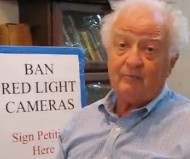8/7/2015
Arizona: Tucson Voters Will Decide Fate Of Traffic CamerasVoters in Tucson, Arizona will decide on November 3 whether to ban the use of red light cameras and photo radar.

Residents of Tucson, Arizona will be asked whether they want to keep or eliminate the city's automated ticketing machines on November 3. The city council unanimously agreed Wednesday to place citizen's initiative on the ballot, as required by state law. If the public approves the measure, American Traffic Solutions (ATS) would no longer be allowed to issue traffic citations in the city based on photographs.
John Kromko, a former Democratic state lawmaker turned political activist, kicked off the petition drive and soon found himself surrounded by volunteers willing to attend every fair, festival and event in the city to gather signatures. The efforts of his group, Tucson Traffic Justice, proved successful. In June, it turned in over 53,000 petition signatures when only 12,700 were needed to qualify for the ballot. Pima County Recorder F. Ann Rodriguez last month certified the petition, and her sampling suggests the group turned in at least 20,000 valid signatures beyond the minimum required. Kromko says he was motivated to start the effort by the unfairness of the cameras.
"I hear the horror stories about people getting a ticket for missing the line -- getting to the line three-tenths of a second late," Kromko told TheNewspaper. "That's something that an officer on the scene wouldn't even see. It clearly wasn't a threat to safety. I've always thought people should get a fair shake, but the program was clearly set up to trick people."
The Federal Highway Administration agreed with Kromko's assessment in 2009 by taking the extraordinary step of declaring Tucson's unorthodox use of intersection lines "for red light violation purposes" to be illegal (view ruling). Kromko said because of the way photo ticketing profits are distributed and the way the program was carefully structured, a ballot referendum was the only way to remedy the situation.
"They knew there would be no public sympathy for red light runners," Kromko said. "They knew that people who didn't know anything about it would say, 'Well, if you don't want a ticket, don't run red lights.' It was set up so the cops get a cut, and the judges get a cut, and the city gets a cut. There's nobody to stand up for justice because everyone has their fingers in the pie. It was brilliantly done, whoever first thought of this."
Prospects for the ballot measure are good. If the 53,000 residents on record calling for a vote to ban cameras turn out in November, they would likely have a majority. In 2011, Mayor Jonathan Rothschild (D) won his election with 46,733 votes. The first ever public vote on the use of speed cameras happened 24 years ago in Peoria, Arizona when 70 percent of residents voted to reject cameras. More recently, 72 percent of voters in Sierra Vista insisted on sending the camera companies packing. More than thirty cities nationwide have similarly outlawed automated ticketing machines (view a list).
A copy of the petition is available in a PDF file at the source link below.


